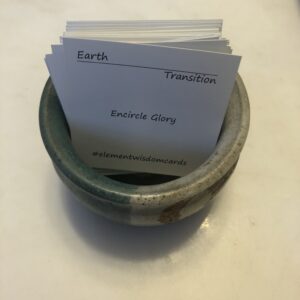Earth: Touch the earth
Nature based prescriptions are one of the fastest growing therapeutics globally as humans grow increasingly disconnected from nature. The research is promising for treatment and prevention of disease. Therapeutics from forest bathing, time spent in nature or greenspace, wilderness activities, even a view from a window and caring for a potted plant have been studied for reduction of disease specific disorders and general well-being.
Spending time in the woods—a practice the Japanese call “forest bathing”—is strongly linked to lower blood pressure, heart rate and stress hormones and decreased anxiety, depression and fatigue.
Time in a forest is linked to decreased inflammation, which has been implicated in chronic disease.
After your time with nature, scan your body for sensations.
Take 3-5 deep and present breaths, expand into your ribs to relax your diaphragm.
Imprint this feeling with gratitude and a positive affirmation.
Scientists have repeatedly found that human anticancer natural killer cells significantly increase after walks in a forest. In one such study, published in 2010 in the Journal of Biological Regulators and Homeostatic Agents, the number and activity of killer cells increased in a group of twelve healthy men after two walks, each two hours long, in a one-day trip to a forest park in the Tokyo suburbs. So did anti-cancer proteins, according to the research led by Qing Li, an associate professor at the Nippon Medical School. Cortisol in the blood and adrenaline in the urine significantly decreased. The effects lasted at least seven days, the researchers found.
Providing fun and uncomplicated ways to live in dynamic harmony with the seasons has been my focus over the last five years. My clinical pearls are available as five seasonal decks offering a year of daily guidance and inspiration (element-wisdom.com).
Positive Affirmations from the Element Wisdom Earth deck:
It’s okay, really.
Everything I need is already here.
I am.
 Click to learn more about Element Wisdom Cards
Click to learn more about Element Wisdom Cards
A study published in Nature’s Scientific Reports in 2019 found the 20,000 participants were significantly more likely to report good health and well-being when they spent 120 minutes or more in nature a week. The good vibe peaked at 200 to 300 minutes a week. Anything less than two hours didn’t make a difference.
There still is a lot researchers don’t know, like how physiologically nature influences health. They are racing to find answers by scanning brains, quizzing people to see how cognition is affected by different environments and planting a full-grown forest in a schoolyard to learn how much and what type of tree canopy is needed to curb air pollution and alleviate asthma.
Clinical trials found that every park visit decreased parents’ stress and increased children’s resilience.
Pediatricians at the UCSF Benioff Children’s Hospital in Oakland, Calif., have been so concerned about the lack of nature in their urban patients’ lives that they write prescriptions for it. Every year, “we ask: Do they have access to outdoors and green spaces? If no, they automatically get a referral to our program,” says Nooshin Razani. One Saturday a month “we invite them to nature outings with us,” she says.
How are you touching the earth today?

